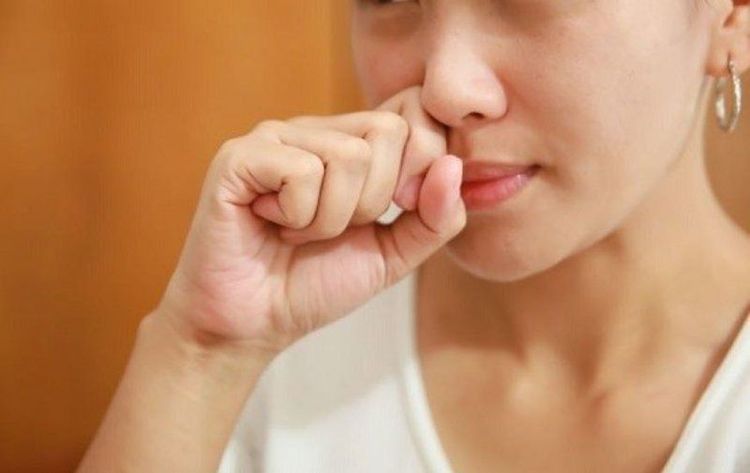This is an automatically translated article.
The taste disorder usually does not directly affect the patient's life, but can be indirectly dangerous if the food is stale, the burning smell of burning or gas leakage is not detected...
.
1. What is a taste disorder?
Normally, a person will have 5 senses including smell, touch, taste, hearing and sight. The role of these senses is to help people perceive stimuli from the external environment. Taste and smell play a role in eating and drinking, helping people to know whether food can be used anymore through specific flavors.
As for taste, the four basic tastes are salty, sweet, sour, and bitter. Taste disorder is a manifestation of sensory disturbance, caused by damage to the area of the brain that controls sensory functions, making the patient unable to perceive the taste of food.
About the sense of smell, normally can distinguish 10,000 different odors, the smell stimulates the salivary glands because there is a connection between smell and taste, so people with olfactory disorders will often accompany it. poor taste or loss of taste, also known as a taste disorder. Smell abnormalities occur when this organ or the organ that perceives odors is malfunctioning. Smell disorders are usually divided into the following categories:
Loss of smell: Loss of sense of taste Odor disorder: This is a condition in which the patient has hallucinations of an unpleasant smell. Odor: An increased sense of smell. Decreased sense of smell: This disorder is usually temporary, often caused by the flu. Loss of smell due to aging: Occurs as the patient ages. Taste disturbances are not usually life-threatening but can be dangerous if the person has a loss of smell, as the person may ingest stale food, not detect the burning smell of burning... and can lead to to depression.

Rối loạn mùi vị có thể gây ảnh hưởng tới đời sống của người bệnh
2. Signs of taste disorder
People with taste disorders can experience many different symptoms depending on the condition. Common signs of taste disorders are as follows:
Not able to clearly perceive the flavors of food or water, patients often perceive all of them as having the same taste. This is very dangerous because sick people cannot recognize spoiled, toxic food and they will face a great risk of food poisoning. In some cases, it is possible to experience a salty taste when eating and drinking even though the food does not contain salt. Sometimes a taste disorder is only temporary, especially after a cold or flu, but in people with head injuries, there can be permanent loss of taste or a false sense of smell (the patient can only smell rotten or pungent odors). also known as the odor hallucination). In severe cases, patients with olfactory disturbances and taste disturbances will completely lose the ability to taste. These symptoms make patients lose their appetite, stop eating, leading to many serious consequences for the patient's health.
3. Causes of taste disorder?
For taste disorders, the following main causes often cause this symptom:
Lesions in the mucosa, taste buds or nerve fibers of the brain, brainstem, and cerebral cortex are all causes. taste disturbance. Inflammatory conditions: Candidiasis, gingivitis, salivary gland inflammation... Nerve damage, endocrine diseases such as adrenal insufficiency, Cushing's syndrome, cretinism, diabetes, hypopituitarism, .. Local changes of taste buds such as chemicals, drugs, dry mouth. Suffering from cachexia, chronic kidney failure, cirrhosis of the liver, vitamin deficiency or depression, schizophrenia. There is a neoplasm of the base of the skull or cancer of the oral cavity. For olfactory disorders, the following main causes often cause this symptom:
Nasal polyps, colds, flu, nasal congestion, upper respiratory tract infections,... are often the main causes of abnormalities. usually olfactory. It can be caused by a deviated septum, damage to the olfactory fissure, sinus infection, or partial damage to the olfactory bulb, depression, or head trauma. Taking a long-term medication. The drugs often cause olfactory disturbances such as antihistamines, anti-edematous drugs... The aging process or tumors in the nose and meninges, chemotherapy or radiation treatment. Some cases due to poor oral hygiene, partial seizures.

Người bệnh có thể mắc nghẹt mũi, viêm đường hô hấp trên
4. Treatment of taste disorders
Treatment of taste disorders is usually based on the cause. The main treatment methods are as follows:
Treatment of taste disorders by medical methods:
Treatment of diseases of the nose and sinuses causing decreased sense of smell, taste disturbances: Using antihistamines, drugs topical spray or decongestant. Causes of taste disorders due to bacterial and fungal infections of the oral cavity: Can stimulate saliva secretion using artificial saliva, eliminate local stimuli, clean teeth or use dentures . Endocrine causes: Treat endocrine disorders with appropriate hormone replacement. Other methods such as: Substituting drugs that cause taste disturbances; nutritional supplements; Eat slowly, chew thoroughly to increase the release of taste chemicals, increase saliva production. Treatment of taste disorders by surgical methods:
Solve by surgical methods for the causes of nasal obstruction that disturb the sense of smell, affecting taste. Nerve decompression surgery is performed in the setting of nerve compression injuries (VII nerve decompression). In ear surgery, avoid damage to the atrial nerve. However, in the case of taste disorder caused by central nervous system damage, neuropathy in end-stage diabetes, multiple sclerosis, cancer, etc., catheterization cannot be treated. .
In conclusion, not all causes of taste disorders are preventable. But people with taste disorders should not smoke, and if it is due to allergic rhinitis, they should avoid allergens. Besides, because head injuries can cause taste disturbances, for safety reasons, everyone should wear a helmet when riding a motorbike. In addition, patients need to go to a reputable hospital to conduct examination and treatment as soon as there are signs of taste disorders. Currently, Vinmec International General Hospital is one of the leading prestigious hospitals in the country, trusted by a large number of patients for medical examination and treatment, not only equipped with modern and advanced equipment. The faculty has 6 ultrasound rooms, 4 DR X-ray rooms (1 full-axis scanner, 1 intensifier, 1 synthesizer and 1 mammogram), 2 x-ray machines. DR mobile x-ray, 2 multi-row CT scanner rooms (1 128 arrays and 1 16 arrays), 2 Magnetic Resonance imaging rooms (1 3 Tesla machine and 1 1.5 Tesla machine), 1 angiography room 2 levels of interventional blood and 1 bone mineral density measurement room.... Vinmec is also the place to gather a team of experienced doctors and nurses who will greatly assist in the diagnosis and early detection of signs. abnormality of the patient's body. With a space designed according to 5-star hotel standards, it is guaranteed to bring patients the most comfort, friendliness and peace of mind.
Please dial HOTLINE for more information or register for an appointment HERE. Download MyVinmec app to make appointments faster and to manage your bookings easily.













